
We visited the Enaikishomi School again in January 2017.
Pupil numbers have grown significantly and are now around 230 with ages ranging from 3 to 12/13 years. As usual there are some steps forward and alas some steps back but, all in all, the School is making excellent progress and is now a pioneer in many areas such as environmental conservation and permaculture.
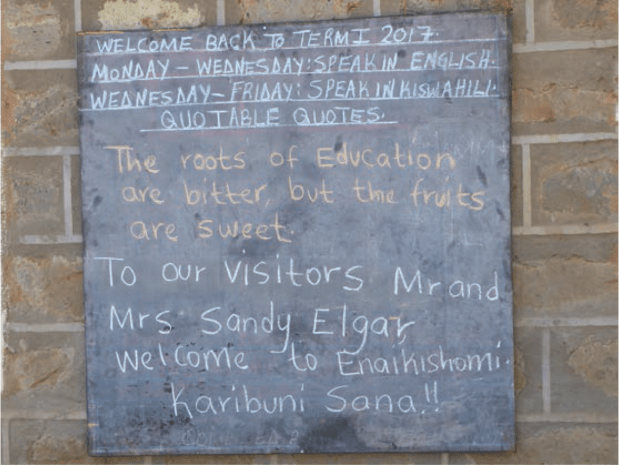
Enaikishomi Examination Results
The pupils at Enaikishomi have consistently performed extremely well in the continuous assessment tests. Of the 22 schools in the North Laikipia district, Enaikishomi nearly always features in the top three. It has to be said that the Enaikishomi teachers are intensely competitive and are mortified if their class performs less well than expected! This is a significant achievement for a newly founded school that was established just thirteen years ago with only nursery children.
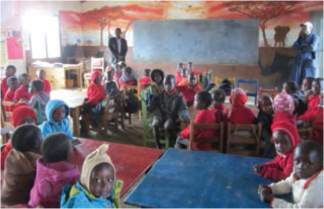
From nursery class
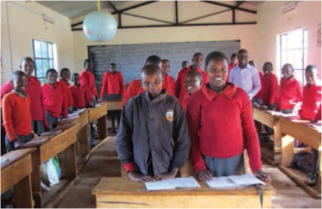
To grade 6 class
The results are a great tribute to the dedication of our excellent team of teachers and the hard work of the children, most of whom come from homes without lighting (which makes homework difficult) and whose parents are frequently illiterate. It is immensely encouraging that a new generation of Kenyans is being well educated and hopefully equipped to help cope wIth the many political and environmental problems that will face the country in the near future.
The School Garden
The garden has been transformed. On our last visit 15 months ago, we visited the garden at Borana which has been totally changed through the introduction of permaculture methods by Llewelyn Dyer who has a missionary zeal for this form of agriculture. Llewelyn impressed both us and our volunteer, Richard Barrett who encouraged us to pay for the school gardener, Dan to take a two week course in permaculture presented by Joseph a local Maasai, the brother of one of our teachers, Jane. Dan is now a convert to permaculture and the benefits are evident throughout the School compound.
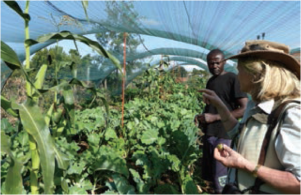
Permaculture with Dan
In essence, permaculture is a revolution against monoculture (planting huge fields of the same crop) and advocates companion planting of different vegetables and fruits which support each other by providing shade to reduce evaporation or by introducing nitrates into the soil. Great emphasis is placed on the virtues of mulching and the benefits of not digging! This is necessarily a simplistic explanation but the importance of this new form of agriculture cannot be overstated in a very poor region where the pastoral way of life is becoming unviable as the large herds of cattle, sheep and goats have reduced community land to a near desert.
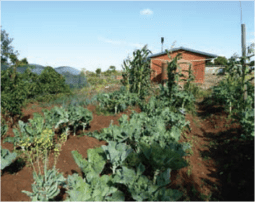
Vegetable garden in the new kitchen
Sadly in Laikipia, there is now armed conflict (alas inflamed by local politicians in the run up to new elections) between different tribes competing for diminishing grazing especially in times of drought. During our visit we saw herds of cattle being driven along the road outside the School in search of fresh pasture. A possible solution is for the young generation to be taught and to experience at first hand that permaculture provides a very real opportunity for poor people with a small area of land to provide nutritious food for their families in a sustainable way. . . an important challenge for the young to offer leadership in communities of carnivores who apparently view vegetables with great suspicion!

Herds of cattle looking for grazing on the road outside the school
The Enaikishomi garden is now an oasis of green in an arid environment and indeed we were interested to hear that its reputation has spread and local people come to have a look. The garden has now developed well beyond the original plot and potatoes, cabbages, passion fruit etc are sprouting up all over the school compound in front of classrooms, and the project/ sewing room. There is also planting behind the staff accommodation where Dan has a filter system to use the grey water from the basins and showers to water banana and mango trees. It is a truly amazing and uplifting achievement that has reinforced our view that Dan (who for many years was considered by the community and the school governors as less important than the teachers) is now teaching life skills that will, in the long term, enable the new generation to provide food for their families. Indeed, we were delighted to hear that the children have nicknamed Dan “Uncle Fruits” – a great tribute to a remarkable yet humble man.

An oasis of green
We were also delighted to hear that teacher Morris, the founder of the scout group and leader of the environmental club, is working very closely with Dan and enthuses his pupils to help with the watering and the nurturing of seedlings in the tree garden. Dan showed us a seedling that he had grown from seed of the extraordinary Moringa Tree whose leaves have amazing properties when dried for purifying muddy water and when blended with food offer unexpected pleasures for the aged!
However, a major worry is the prevalence of elephants who are prowling around the neighbourhood. They can smell water from miles around and indeed invaded the Enaikishomi garden some years ago. What is even more worrying is that Dan is growing bananas and pumpkins which elephants love!

Drip feed using plastic bottles
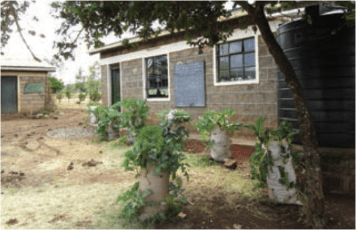
Drip feed in front of staff admin room
The Parents
This year we did not have a full meeting with the parents but we commissioned a research report to help us understand their experience of and attitude towards the School. We also hoped that it might shed some light on the reported reluctance of some parents to pay school fees and what could be done about it. The report was prepared by Reagan Onyango, the Monitoring and Evaluation Officer at Lewa.
It is encouraging that we strongly agree with the parents’ expressed priorities for more classrooms (we gave the go-ahead for the construction of two more), more teachers (we will be employing another teacher immediately) and more books – a need which we hope will be met by the library being created by the deputy head, Benjamin).
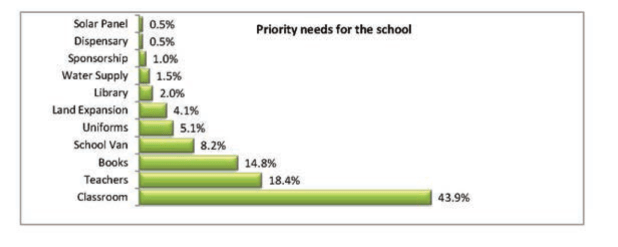
However we are strongly opposed to their fourth priority for the provision of a school van as this would be detrimental to both Enaikishomi which would experience a surge in pupil numbers and the neighbouring government school at Ethi would certainly have a corresponding decrease in pupils. Hard as it may seem we have no alternative but to ration attendance by distance.
It is also fascinating that only 1% of parents favour sponsorship of individual children, something that we have always avoided on the grounds that it can create jealousy and ill feeling in what is a small and close knit community – far better to sponsor a teacher who can teach thirty children.
The Environmental Club
Teacher Morris is managing the club which was the brainchild of a volunteer, Richard Barrett who spent eight months at the School in 2015/2016. There are now 44 members of the club who help with the planting of trees and the watering of the school garden. They are also responsible for clearing up and disposing of any rubbish in the school grounds which during our visit were immaculate. This not only provides good training but also serves as a much needed example in a country where every village is disfigured by lots of rubbish at the roadside.
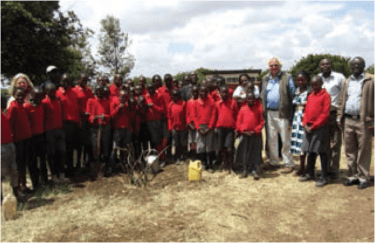
Planting of the croton tree
Under the leadership of Morris, the club is trying to find ways of stopping the local community from cutting down trees for firewood or charcoal. It is making efforts to persuade the local people to use cheap but efficient wood burning cookers which use a fraction of the wood of an open fire while at the same time producing very little smoke – an important health benefit as most of the wattle and daub houses have no chimneys. This will hopefully reduce the demand for firewood and the incentive to cut down trees.
During our visit the Environmental Club instructed us on the planting of a Croton tree.
The club is very popular with the pupils not least because at the end of the day they are able to watch an episode of Planet Earth presented by David Attenborough which is hugely popular.
The Water System
We were very pleased to discover that the solar pump and back up batteries at the borehole have been well maintained by Dan the gardener and are working well. Dan is also efficiently managing the sale of water to the local community (at 5 KES per 20 litres – about 4 pence) and this is generating a small amount of income for the School. More importantly, it is a very real benefit to the community particularly during the many periods of drought.
During our visit there was a sharp downpour which enabled us to check out all the water tanks. One of the 500 litre plastic tanks remained empty as the supply gutters had twisted and warped in the heat. This is indicative of a lack of basic maintenance – something that we will be addressing. There was a leak in one of the new 10,000 litre brick tanks and to our consternation the other brick tank had not been connected to the drip feed water system in the garden. It was very frustrating that this tank (right next to the garden) was full to the brim with 10,000 litres of water that had never been used for irrigation!
Planting of the croton tree 6 We think it very important that the water from the storage tanks is used efficiently to help preserve the aquifer that supplies the borehole. There would be a very serious problem if the aquifer were to become exhausted.
The Kenyan Government
The School is registered with the government so that the pupils can follow the national curriculum. We have had our problems during the last few years and have had to oust two government teachers one for drunken behaviour and the other for be having in an arrogant authoritarian manner that undermined the morale of all the other staff. Technically, we have no right to dismiss teachers appointed by the government and had to exert strong pressure on the local director of education to effect their removal. In order to establish better relations we invited the official from the TSC (Teachers Service Commission ) to meet with us at the School. He was pleasant and helpful and explained in some detail how teachers are appointed. We impressed on him our wish that only the best teachers should be appointed to Enaikishomi. He agreed to supply an additional government teacher although there is a need for two. However, he then explained that he needed at least 100 more teachers for the schools in his district of Laikipia but only had funding to employ 10. We therefore agreed that we will employ at our expense another teacher to bring the team up to strength.

The teachers and Dan
We currently have three government teachers who are performing well. Anthony, the headmaster, Boniface, and a new deputy head, Benjamin who is making an excellent contribution.
The government has equipped the school with an impressive array of solar panels. This means that there is now power and lighting in all the classrooms and the staff admin room. In order to fulfil an election pledge, the government has just supplied the school with 22 laptops – 2 for the teachers and 20 for the children. However, these will remain idle until the official launch which we are told will take place immediately before the election in August so that the government gets the maximum credit. The teachers are also awaiting training on how to use the laptops in the classroom. Fortunately, our excellent Lewa Education Officer, Faith Riunga has established a digital literacy team at Lewa who will provide the necessary training should the government training not be forthcoming. Nevertheless, it is encouraging that the government now recognises Enaikishomi as an excellent school and it has been chosen to pioneer and test a new series of textbooks. During our visit we briefly met some officials who came to monitor progress, which was apparently very satisfactory.
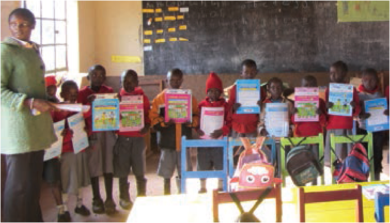
Textbook trial
Sports and Games
Great progress has been made under the direction of the very fit and enthusiastic sports teacher, Morris who has done an excellent job in teaching the rules, tactics and theory of volley ball, football (which is enjoyed by both girls and boys) and netball. The children now understand the importance of teamwork and the need to follow the rules. Some practice matches are refereed by the children (under Morris’s direction) so they get a good understanding of the laws of the game.
It was wonderful to see the children one sports afternoon using the new balls donated by Bob Reeves and his friends.
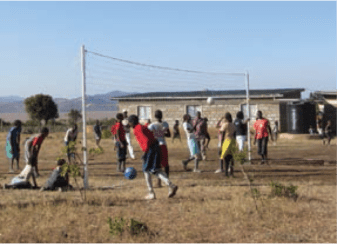
Volleyball
The Enaikishomi football team now plays against other schools and seems to have done quite well. We have agreed to supply the players with T-shirts, shorts and number vests, some of which will be made by the sewing group. We are concerned that there are still some very large stones in the football field which are too heavy to dig out by hand. The school governors have promised to have these removed by a local contractor with a tractor.
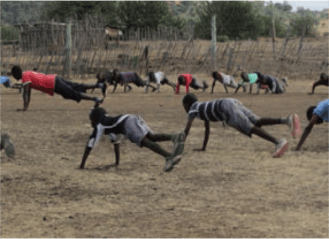
Exercise before games
Morris also trains the children in athletics and during our visit many pupils were running up and down the road outside the School. A few athletes took part in the Lewa marathon where apparently they did well.
It is difficult to overstate the fun and sheer enjoyment that these children from very poor backgrounds get from playing sport at Enaikishomi.
Book Supply Problem
During the course of our interview with one of the teachers, Brenda we were surprised and concerned when she complained about a lack of exercise and textbooks that should have been supplied by the government. For us this is immensely frustrating and disappointing. How could it happen that having built 8 classrooms and employing six teachers, we are supporting a school where the children do not have enough books!
We raised this problem subsequently at a meeting with the headteacher, Anthony and the school administrator, Faith Riunga. It appears that at the beginning of every term Anthony orders the books from the local education office but owing to a shortage of government funds there was a delay of some three months before they could supply them. Anthony raised this problem with Faith who responded that it is his job to ensure the local officials supply the books ordered. This is a “tough love approach”. Faith is concerned that if, as donors, the Amy Elgar Trust steps in and buys the books the local officials and possibly the Headteacher will take this for granted and Enaikishomi will always be put to the back of the queue (in favour of other schools) when funds are in short supply.
As a result of this problem, the children in Brenda’s class were left for about three months without the books necessary to follow the curriculum. . . a failure that is immediately apparent as her class slipped down in the local examinations league table. We proposed a solution to this problem whereby, when government funds for the purchase of books were slow (as is nearly always the case), the Amy Elgar Trust would immediately lend (not give) the School sufficient funds to purchase the books on the understanding that the School would reimburse the Amy Elgar Trust when the government funds became available.
We apologise for this rather long winded story but it is an important lesson illustrating how important it is for donors to engage face to face with the teachers to understand their ambitions and frustrations and to suggest a possible solution which allows everyone to save face and which costs no money save interest on a short term loan.
Chess
Last year we gave two chess sets to the School and were delighted to hear that teacher, Trizer has formed a chess club which now has 30 members – 15 girls and 15 boys. The children enjoy chess and apparently beat Trizer on a regular basis. They are also teaching the game to the Deputy Head Benjamin.
We were so pleased and impressed that we have donated a further two sets that were purchased locally in Nanyuki.
The School Committee
The government has recently made a regulation whereby school governors have to have a minimal level of education and be elected every three years. This has had a significant and beneficial impact. The newly elected committee members are in the main impressive. It is especially encouraging that the new treasurer is a qualified accountant, Stephen Ilaut who has an excellent command of English and works at the nearby Borana Lodge. He has promised to prepare a formal budget, projecting forward income and expenditure and introducing a transparent system of accounts. This is essential to ensure that no funds are misused from the School account.

The school governors
There is a continuing problem of parents not paying school fees especially in the second and third term. The situation was not helped by a politician declaring that parents should not pay school fees as his government had fulfilled its election pledge that primary education should be free for everyone. In practice, most government schools are seriously strapped for cash and have various charges for school meals, books, uniforms etc. We think it important that parents do pay school fees (albeit very low fees of KES 400 per child per term – about £3 per child in addition to a one-off initial membership fee of KES 1,000 – about £7 per immediate family) so they understand the value of education and do not fall victim to the dependency culture which can all too easily take root in very poor communities such as Enaikishomi.
We are hopeful that during the coming year the parents will become more involved in the School thanks to the excellent suggestion of the new deputy Head Benjamin that there should be regular parents’ evenings. . . something that has been overlooked but which is now very important given the size of the School. We hope these meetings will help the parents (many of whom are illiterate) to appreciate the value of education and understand the progress being made by their children.
The School Playground
In view of the increase in the number of children, there is now a need for more play equipment especially for the younger children. It was suggested that we should install some rubber tyres that the children could crawl through or jump over. We need to think about this carefully and discuss with our administrator Faith Riunga.
The Sewing Group
This was a huge disappointment. The sewing group started some three years ago with around ten ladies being taught to use Singer Sewing machines installed in a corrugated iron shed that had been purchased from some building contractors. We were inspired to encourage the group by buying more machines and constructing a smart new purpose built project room. There were then problems with the teacher, Judith who proved to be very unreliable and erratic in her attendance. It was agreed to dismiss Judith and after much searching a new male teacher, Gregory has been appointed. We were impressed with Gregory who is very professional, offering high quality teaching. However, at the time of our visit, there were only four adults (one male and three females) engaged in the training programme. We were dismayed by the low attendance especially as the sewers are paid for the uniforms that they make for the school children. It is difficult to understand why so few ladies are taking advantage of this opportunity. . . one reason may be the drought has caused them to migrate with their families to Mount Kenya in search of pasture land or alternatively the men may have left with the cows thereby increasing the domestic burdens on the women.

Sewing teacher Gregory and pupils
The School governors shared our disappointment and promised to ensure that all the parents and the wider community are aware of this great opportunity on offer. We are hopeful that the number of sewers will be much higher on our next visit.
Conclusion
This was an excellent visit and helped further our good relations with the teachers, the school governors, the children and the community. We are especially grateful to the community who kindly gave us two beautiful Maasai blankets. . . something to remember them by during the cold English winter !
We think that the two new classrooms and staff accommodation units to be built over the next few months will be sufficient to carry the School forward in the years to come. These new buildings represent a fulfilment of a promise made some years ago to educate the children to the age of fourteen when they will be well prepared for new challenges at secondary school.
We would like to thank the many supporters of the Enaikishomi School and can assure them that the money they have given is being well spent and making a significant difference to the children in one of the poorest communities in Kenya.
With best wishes
Edward and Sandy Elgar
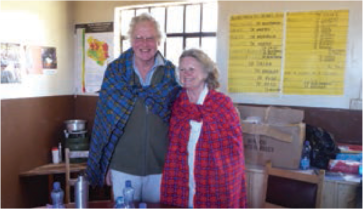
Wearing our gifts from the school governors